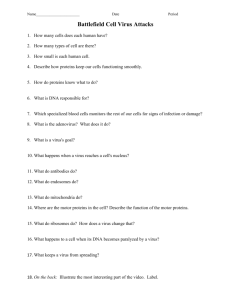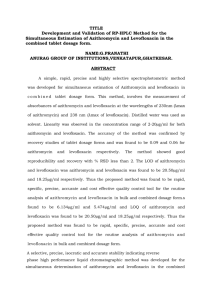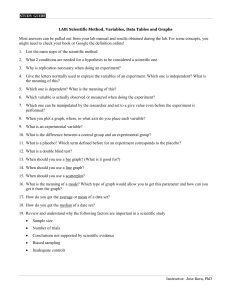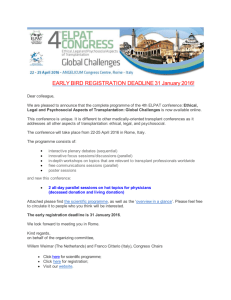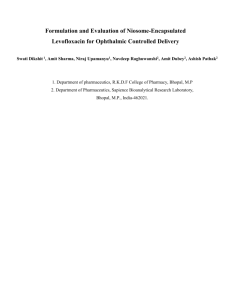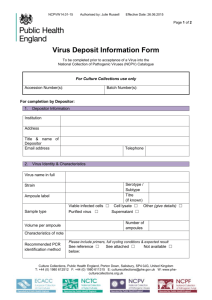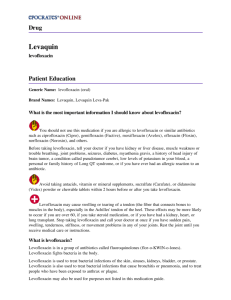DOCX ENG
advertisement
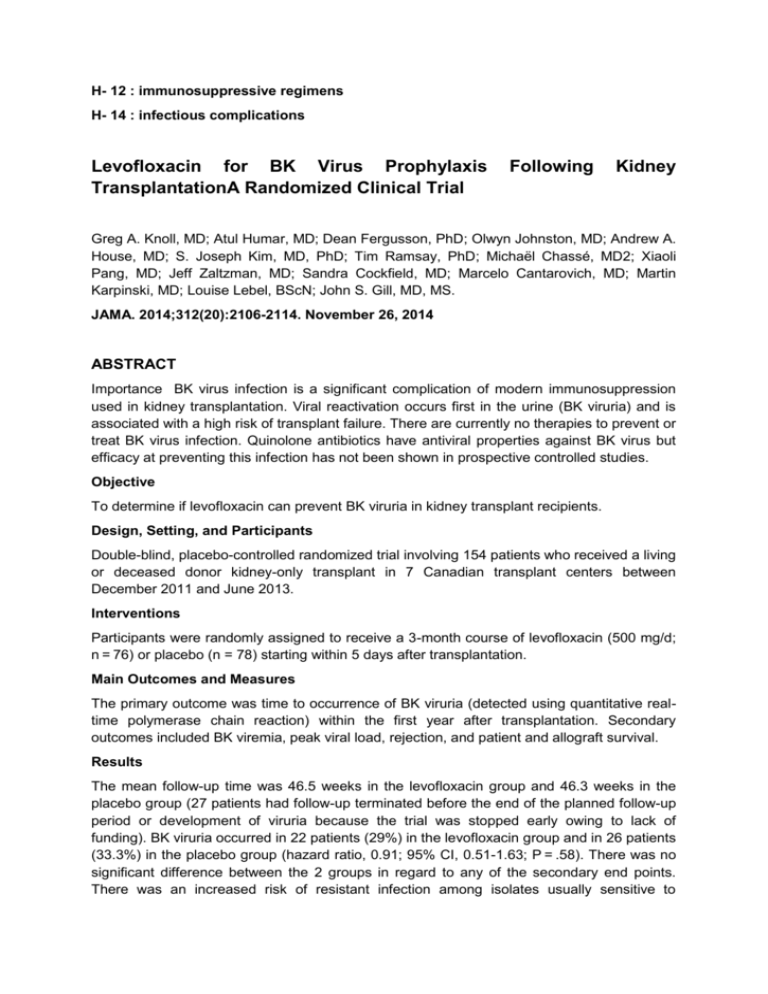
H- 12 : immunosuppressive regimens H- 14 : infectious complications Levofloxacin for BK Virus Prophylaxis TransplantationA Randomized Clinical Trial Following Kidney Greg A. Knoll, MD; Atul Humar, MD; Dean Fergusson, PhD; Olwyn Johnston, MD; Andrew A. House, MD; S. Joseph Kim, MD, PhD; Tim Ramsay, PhD; Michaël Chassé, MD2; Xiaoli Pang, MD; Jeff Zaltzman, MD; Sandra Cockfield, MD; Marcelo Cantarovich, MD; Martin Karpinski, MD; Louise Lebel, BScN; John S. Gill, MD, MS. JAMA. 2014;312(20):2106-2114. November 26, 2014 ABSTRACT Importance BK virus infection is a significant complication of modern immunosuppression used in kidney transplantation. Viral reactivation occurs first in the urine (BK viruria) and is associated with a high risk of transplant failure. There are currently no therapies to prevent or treat BK virus infection. Quinolone antibiotics have antiviral properties against BK virus but efficacy at preventing this infection has not been shown in prospective controlled studies. Objective To determine if levofloxacin can prevent BK viruria in kidney transplant recipients. Design, Setting, and Participants Double-blind, placebo-controlled randomized trial involving 154 patients who received a living or deceased donor kidney-only transplant in 7 Canadian transplant centers between December 2011 and June 2013. Interventions Participants were randomly assigned to receive a 3-month course of levofloxacin (500 mg/d; n = 76) or placebo (n = 78) starting within 5 days after transplantation. Main Outcomes and Measures The primary outcome was time to occurrence of BK viruria (detected using quantitative realtime polymerase chain reaction) within the first year after transplantation. Secondary outcomes included BK viremia, peak viral load, rejection, and patient and allograft survival. Results The mean follow-up time was 46.5 weeks in the levofloxacin group and 46.3 weeks in the placebo group (27 patients had follow-up terminated before the end of the planned follow-up period or development of viruria because the trial was stopped early owing to lack of funding). BK viruria occurred in 22 patients (29%) in the levofloxacin group and in 26 patients (33.3%) in the placebo group (hazard ratio, 0.91; 95% CI, 0.51-1.63; P = .58). There was no significant difference between the 2 groups in regard to any of the secondary end points. There was an increased risk of resistant infection among isolates usually sensitive to quinolones in the levofloxacin group vs placebo (14/24 [58.3%] vs 15/45 [33.3%], respectively; risk ratio, 1.75; 95% CI, 1.01-2.98) as well as a nonsignificant increased risk of suspected tendinitis (6/76 [7.9%] vs 1/78 [1.3%]; risk ratio, 6.16; 95% CI, 0.76-49.95). Conclusions and Relevance Among kidney transplant recipients, a 3-month course of levofloxacin initiated early following transplantation did not prevent BK viruria. Levofloxacin was associated with an increased risk of adverse events such as bacterial resistance. These findings do not support the use of levofloxacin to prevent posttransplant BK virus infection. Trial Registration clinicaltrials.gov Identifier: NCT01353339 COMMENTS Kidney transplantation is the preferred treatment for end-stage renal disease. The development of potent immunosuppressant medications has reduced the incidence of acute rejection to less than 10%. This improvement has not come without a cost, as BK virus infection has emerged as a major complication of kidney transplantation. BK virus is a polyomavirus with a prevalence of 60% to 80% in the general population. Immunosuppression leads to viral reactivation. BK virus infection progresses through discrete stages, appearing first in the urine (BK viruria), then in the blood (BK viremia), and ultimately in the allograft (BK virus nephropathy). BK virus nephropathy leads to transplant failure in 10% to 100% of affected patients. There are no proven strategies to treat BK virus infectio. Retrospective studies have shown that use of quinolone antibiotics is associated with less BK viruria, viremia, and nephropathy. The purpose of the current study was to assess the efficacy and safety of levofloxacin compared with placebo for the prevention of BK viruria. A double-blind, placebo-controlled randomized trial involving 154 patients was set. For the trial, the target dosage of levofloxacin was 500 mg/d for 3 months administered orally once daily. The 500-mg/d dosage was given as two 250-mg capsules to allow for dosage reductions if required. At each study visit, creatinine clearance was estimated using the Cockcroft-Gault formula and the dosage of levofloxacin was adjusted based on guidelines. The medication was started as soon as the patient was able to take oral medications but within 5 days after transplantation19 with a goal of preventing early viral replication. The primary outcome of the study was the time to occurrence of BK viruria within the first year after transplantation. BK viruria was defined as 500 copies/mL or more of BK virus DNA in the urine The primary outcome of BK viruria occurred in 22 patients (29.0%) in the levofloxacin group and in 26 patients (33.3%) in the placebo group (risk ratio [RR], 0.87; 95% CI, 0.54-1.39). This translates into an absolute reduction of BK viruria by 4.4% (95% CI, −18.9% to 10.3%). The principal prespecified analysis of the primary outcome (time to viruria stratified by study center) was not significantly different between the groups (hazard ratio, 0.91; 95% CI, 0.511.63; P = .58 by log-rank test) There was no difference between the 2 groups with regard to other clinical events. BK viremia occurred in 7.9% of the levofloxacin group and 11.5% of the placebo group (RR, 0.68; 95% CI, 0.26-1.76) In this multicenter, placebo-controlled randomized trial, a 3-month course of levofloxacin prophylaxis did not prevent the occurrence of BK viruria within the first year after transplantation. Analysis of secondary virologic measures including occurrence of BK viremia, peak urine and blood viral loads, and time to sustained viruria showed that such measures were not significantly different between the levofloxacin and placebo groups. No cases of BK virus nephropathy were observed in either group. Levofloxacin prophylaxis was associated with quinolone resistance and a non-significant increase in suspected tendinitis, a well-known side effect of quinolones. Pr. Jacques CHANARD Professor of Nephrology


